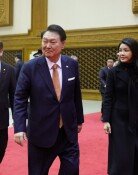Story of young defectors draws attention to starving N.K. children
Story of young defectors draws attention to starving N.K. children
Posted May. 30, 2013 05:02,
At a marketplace in Hyesan City in Yanggang Province, North Korea in 2012, a 13-year-old girl named Yoo-jin sold bean sprouts, crouching down on the ground all day long. She never heard from her mother who had left home to earn money six years ago. As the girl couldn`t go to school anymore, she had to manage to live while staying at the house of her aunt who had problems getting around.
Yoo-jin was always hungry. She doesn`t recall having three meals a day. Even when she could eat, swollen noodles or corn were all she could afford. She had to skip meals for many days and she couldn`t eat for three days and had to stay in bed one day. Sometimes she ate raw bean sprout she was selling. She had but to glimpse at "artificial meat rice" selling at the market. Made with ground beans that looked like meat, the artificial meat rice was Yoo-jin`s favorite food.
At the end of last year, Yoo-jin defected from the North through the Duman River. Her mother who had escaped from North Korea succeeded in bringing her daughter through a broker at the eighth attempt. When her mother asked her what she wanted to eat, Yoo-jin said she wanted to eat artificial meat rice.
○ Fear of hunger greater than Kim Jong Un
North Korea`s food supply has been worsening since the launch of the Kim Jung Un regime in April last year. The Food and Agricultural Organization of the United Nations projected the North`s food shortage at 500,000 tons last year, but revised it to 657,000 tons in February this year. A continued food shortage will force 2.8 million North Koreans suffer hunger. The U.N. World Food Programme`s assessment for North Korea in early May said 80 percent of 87 North Korean households surveyed between January and March this year were suffering from malnutrition.
The vulnerable people including babies in North Korea are exposed to food shortage problem. According to North Korea food report released jointly by UNICEF and the World Food Programme, 475,868, or 27.9 percent of North Korean children, are in a chronic malnutrition state. Among them, 8.4 percent were in severe hunger.
A five-year-old boy who defected with his mother is going to an alternative school rolled on the floor one day due to stomachache. Something went wrong with his intestines as he ate a lot after having been used to be hungry for a long period. Park Seon-yeong, chairman of the board of the school, said, "Children`s intestines are not working properly, making them suffer from indigestion and get enema in some cases."
North Korean children not only suffer from hunger but also get various diseases due to malnutrition. Kim Jin-hyeok, an eight-year-old kkotjebi, or impoverished child, who defected from the North at the end of last year, was diagnosed tuberculosis recently at a health checkup. He had eaten scraps from meals at marketplaces in the North, which later led to a disease.
○ Continued hunger could bring tragedy of "same people but different race"
Children`s body size in North Korea is getting smaller due to malnutrition. The build of 13-yerar-old Yoo-jin is that of nine- or 10-year-old South Korean boy. He is 30 centimeters shorter than average South Korean boys (156 centimeters).
A 2011 report by the Research Institute for Human Ecology at Seoul National University showed that an 11-year-old South Korean boy was 144 centimeters tall and weighed 39 kilograms whereas a North Korean boy with the same age was 125 centimeters and 23 kilograms. The height and weight gap between South and North Korean boys is 19 centimeters and 16 kilograms, respectively.
Seoul National University Professor Yoon Ji-hyeon said, "Lack of five essential nutrients, including protein and carbohydrate, and microelements, such as vitamin, iron and iodine, negatively affect not only children`s developmental growth but also their cognitive development and learning capability."
Experts say further widening of the gap in nutrition and development can cause serious difference and make people think race is changing. They said this could be explained in terms of epigenetics.
Jeong Seon-yong, a medical genetics professor at Aju University, said, "Just 60 years have passed (since the division of two Koreas), and it is difficult to say a genetic change has happened between South and North Korea. But some gene expression could have varied according to different nutrition state."







